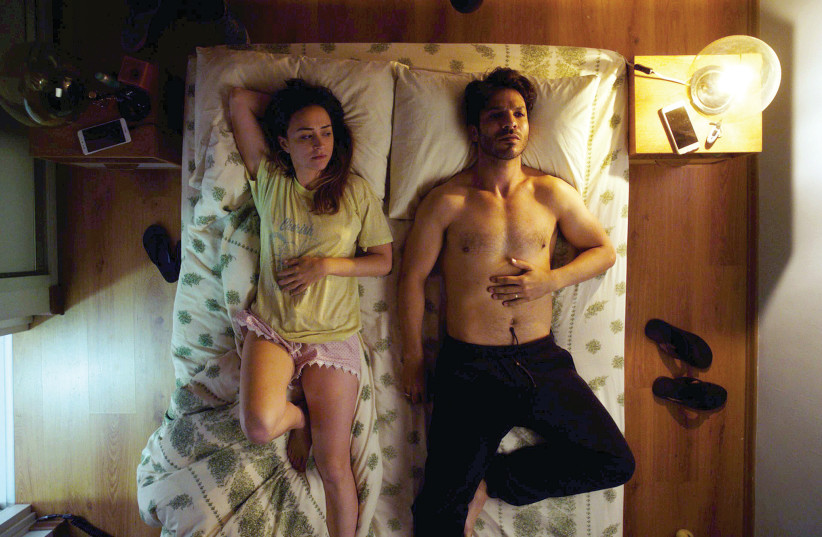Marco Carmel’s Paris Boutique is an intermittently funny rom-com and female-buddy movie set in Jerusalem and it is much like many movies available on Netflix from all over the world. When you watch Paris Boutique in the theater, you will likely be more aware of and annoyed by its contrivances than you would if you were seeing it at home, but it does have a few things going for it that the Netflix movies don’t.
The first is the Jerusalem setting, which makes the most of the narrow streets and alleys around the Machaneh Yehuda market and in the Old City, the two main locations. Using these neighborhoods makes it easy to show the unique sides of the capital. The movie romanticizes the city a bit, but it is portrayed with the knowing affection of someone who enjoys it and recognizes how much fun it can be.
The second is Nelly Tagar, an always appealing actress, one of the funniest Israeli comics and someone who can also hold the screen in more dramatic moments. She will always be remembered for her performance as the aptly named Daffi in Zero Motivation and she has been terrific in any number of other movies and television shows, including Avi Nesher’s Past Life and Erez Tadmor’s The Art of Waiting, as well as the series, Sisters. Suffice it to say, whenever I see her name in the credits of a movie, I am always happy to head for the theater.
Here she plays Neta, the down-on-her-luck owner of what she hoped would be a successful boutique hotel in the market. Her husband has run out on her and left her saddled with his debts, so she works giving rides to tourists to make ends meet. When she picks up Louise (Josephine Drai) at the airport, she instantly realizes that this wealthy young French lawyer could be helpful to her.
Lights up on Paris

The movie actually opens in Paris, with Louise leaving couples therapy with her fiancé and learning from her religious father that she must go to Jerusalem immediately to broker a deal for a compound in the Old City that Jews, Muslims and Christians are fighting over. Asking her father if she should make sure it will be sold to Jews, he tells her to make sure it is sold to the highest bidder. But it takes her a while to even get to the property because Neta virtually kidnaps her, telling her the roads are closed due to a terror attack and she cannot make it to the stony David Citadel Hotel. Instead, Neta brings her to her own funky boutique establishment, touting its cleanliness and babbling about a news report on how dirty fancy hotels are.
LOUISE, WHO is obviously having problems with her fiancé and wants a change from her orderly life, is very much a fish out of water in the crowded market and cobblestoned streets of the Old City, dressed in designer clothes and spike heels, which likely cost as much as many Jerusalemites earn in a year. While it strains credibility that a high-powered lawyer like Louise would consent to be hustled even by such an amiable con-woman as Neta, the concept is that the two women bond over their issues with men.
Louise is vaguely dissatisfied with her fiancé, while Neta is still coping with the emotional and financial baggage from her cheating ex’s departure. When Neta tells her that she can still feel her ex’s presence in the hotel, Louise responds by cleansing the place with burning sage. They are joined in their female camaraderie by Neta’s friend, Yaffa (Batel Moseri), who is even earthier and more direct than Neta.
Neta shows Louise the way to the Old City and the compound she must negotiate the deal for. All three of the holy men who want to buy it are the same breed of hucksters, trying to outbid each other, which is played out for laughs but hints at a broader satire of Old City life, while trying to get out from the rom-com tropes. In the Old City, Louise meets Daniel (Angel Bonanni), a hipster restoring artwork in a church. Although he speaks Hebrew well, it is not clear what his background is, which makes him all the more intriguing to Louise and there is an instant attraction between them. Neta, meanwhile, has a sparring but flirtatious relationship with Avi (Moris Cohen), who runs his father’s butcher shop in the market and frequently lends her his car.
Carmel has made a number of dramas like Noble Savage and the television series, Harem, but he is in a more playful mode here. As these characters work their way through the obligatory romantic misunderstandings and complications, it is entertaining to watch them run around Jerusalem, particularly the Old City, which we are not used to seeing as the setting for light comedy.
On-screen chemistry
Tagar and Drai work well together, and Tagar’s scenes with Cohen brought to mind Amy Irving falling for Peter Riegert as the pickle vendor in Crossing Delancey. The standout in the supporting cast is Angel Bonanni, who starred in the early seasons of False Flag and who has been in such movies as Kicking Out Shoshana. He has to convince us that this wealthy French lawyer would be torn between the comforts of her Parisian life and staying in Israel with him – and he does. Bonanni is so stunning, he’s like a special effect, but unlike some handsome actors who seem full of themselves, he has a natural, likable quality.
As I watched him and Tagar pursue their mostly separate plotlines, I wished the two of them could get the starring roles they deserve in a movie, either a comedy or a drama, that goes a little deeper and creates characters with more complexity than the ones they play in this likable but lightweight entertainment.
